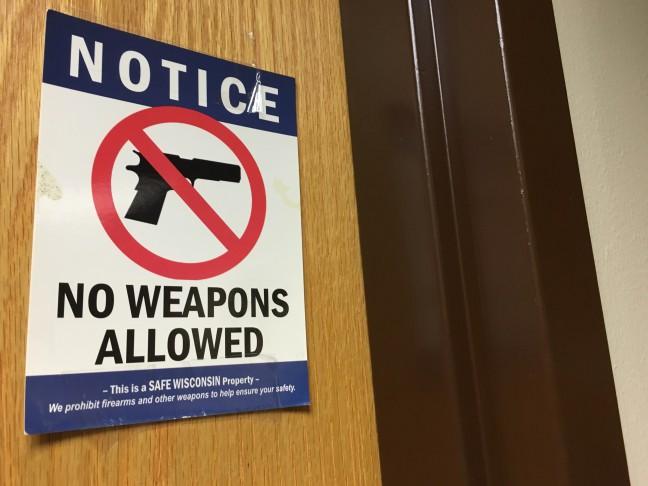Reps. Chris Taylor, Melissa Sargent and Terese Berceau, all Democrats from Madison, announced a bill Wednesday to ban all guns on college campuses in response to campus carry legislation proposed Monday.
The College Campus Dangerous Weapon Ban would ban all deadly weapons — including firearms — from public, private and technical college campuses in Wisconsin, Taylor said.
This new legislation was introduced in opposition to a bill Rep. Jesse Kremer, R-Kewaskum, proposed that would allow conceal carry weapons in campus buildings, according to his statement.
Under current law, residents can carry concealed weapons on campus, but not in campus buildings, Sargent said.
Assembly Speaker Robin Vos said he supports allowing conceal carry weapons in college campus buildings, the Associated Press reported.
Taylor said she wants guns to be banned from all parts of campuses, including inside buildings. She said students shouldn’t have to worry about whether someone sitting next to them in class is carrying a weapon.
“Why should someone bring a deadly weapon onto campus at all?” Taylor said. “It doesn’t make you safer to have a weapon or a gun on campus.”
Kremer said in a statement students are at greater risk when weapons are not allowed in classrooms because they are left defenseless on campus.
Kremer also said he hopes his legislation will decrease violent crime on college campuses.
“Many students walk to and from class in the early morning or late evening, often through high crime areas,” Kremer said in a statement. “Current law requires that they be unarmed. The Campus Carry Act will ensure that our students are no longer denied the right to defend themselves.”
Mike Wagner, a University of Wisconsin professor in the School of Journalism and Mass Communication, said evidence shows people with conceal carry weapons are not able to stop attacks. The majority of students do not have the appropriate training to make them effective users of guns in high stress situations, Wagner said.
Taylor said the recent school shootings in Oregon inspired this legislation. She said the U.S. is in the midst of a gun violence epidemic.
“If the rationale is more guns make you safer, we should be the safest country in the world, and we’re not,” Taylor said.
Sargent said in 2015 there have been more than 40,000 gun violence incidences in the U.S., and 10,000 have resulted in deaths.
In their invitation to co-sponsor, Taylor, Sargent and Berceau said gun-free policies are why college campuses are reported to have some of the lowest rates of crime.
Sargent said many people have come to her terrified of how conceal carry on campus could change the safe atmosphere at colleges.
“Can you imagine going to a Badger football game in Camp Randall, and being surrounded by people who are conceal carrying their guns?” Sargent asked. “That just does not seem like a good idea to me.”
Wagner said gun laws function to decrease the prevalence of guns. If guns are commonplace, Wagner said, it creates easy access for people with mental health conditions who could then be pushed to make the rash decision of killing themselves.
Taylor said she supports other bills to strengthen gun control. She and other lawmakers want to reinstate a 48-hour waiting period for buying handguns, Taylor said.
According to a statement from Rep. Gordon Hintz, D-Oshkosh, the 48-hour waiting period bill would also prevent impulsive violent acts, such as suicide.
Sargent said the end goal is to ensure colleges are as safe as possible.
“I want to make sure that we’re doing everything that we can — everything possibly available to us — to make sure that our campuses are safe for everyone,” Sargent said.
The College Campus Dangerous Weapon Ban bill is circulating now for co-sponsorship.


